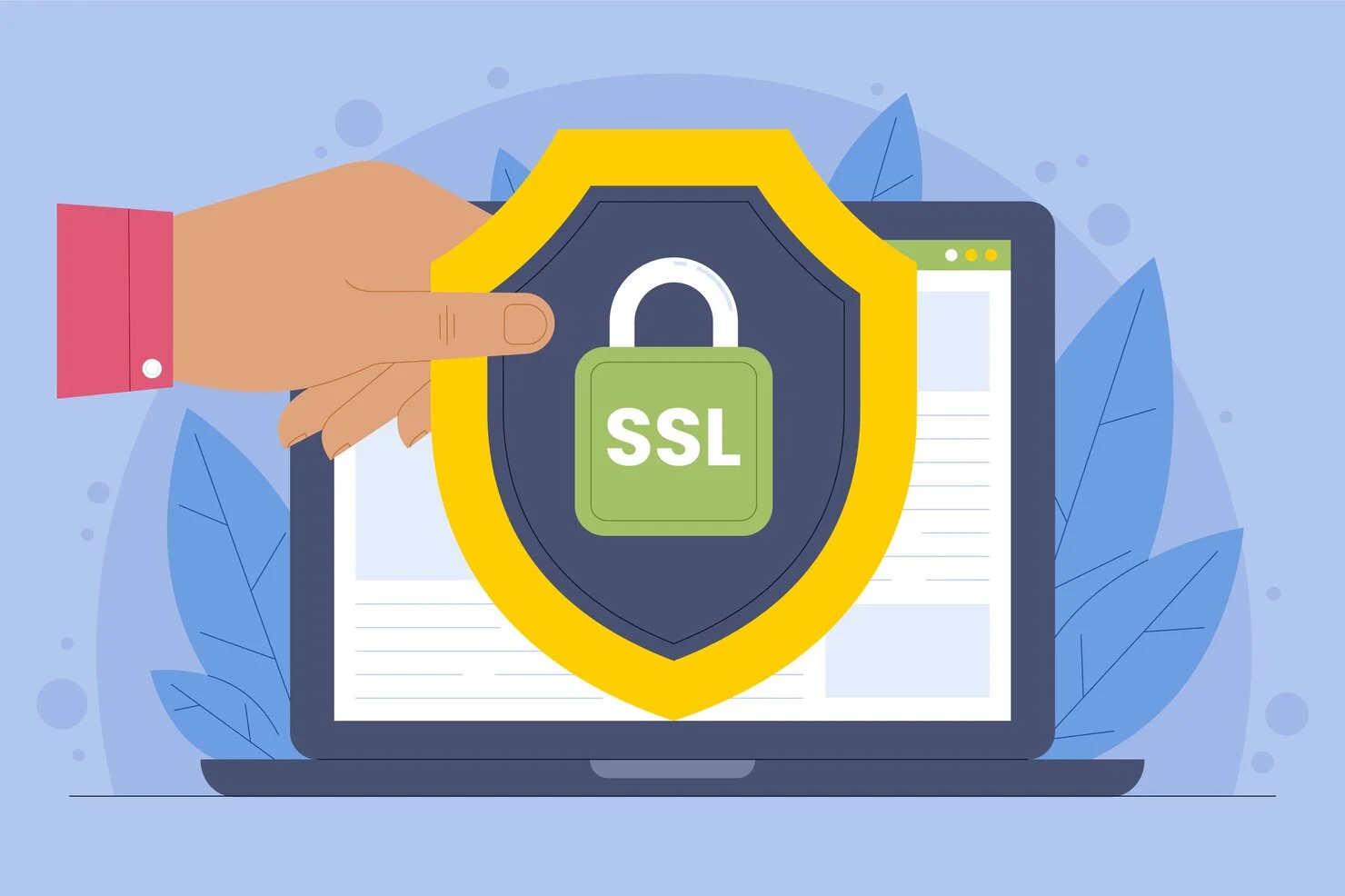SEO
Understanding the Importance of SSL Certificates for Secure HTTPS Connections

In today’s digital age, online security is paramount, and SSL certificates play a crucial role in ensuring a secure HTTPS certificate. Websites that lack this important security feature are at risk of data breaches and cyber-attacks. Understanding the significance of SSL certificates is essential for website owners and users alike.
Introduction to SSL Certificates
SSL certificates, short for Secure Socket Layer certificates, are digital certificates that authenticate the identity of a website and enable secure encrypted connections between a browser and a web server. When a user accesses a website with an HTTPS certificate in the URL, it signifies the presence of an SSL certificate, ensuring data transmitted between the user and the website is encrypted and secure.
What is an SSL Certificate?
An SSL certificate is a digital certificate that binds a cryptographic key to the details of an organization. It ensures a secure connection between a user’s browser and the server hosting the website. This encryption protects sensitive data, such as login credentials, payment information, and personal details, from being intercepted by malicious third parties.
How SSL Certificates Work
SSL certificates work by encrypting data transmitted between a user’s browser and the website’s server. When a user accesses a website with an HTTPS certificate, the SSL certificate initiates a secure connection through a process known as an SSL handshake. This process verifies the website’s identity and establishes a secure, encrypted channel for data transmission.
Importance of SSL Certificates
The importance of SSL certificates cannot be overstated. They provide trust and security to website visitors, protect sensitive data from interception, and improve search engine rankings. Websites without SSL certificates run the risk of being flagged as insecure by web browsers, leading to a loss of credibility and potential visitors.
Types of SSL Certificates
Domain Validated SSL Certificates
Domain-validated SSL certificates validate the ownership of a domain name and provide basic encryption for secure data transmission. They are ideal for small websites and blogs that require a level of security without extensive verification processes.
Extended Validation SSL Certificates
Extended Validation SSL certificates offer the highest level of validation and trust for websites. They display the organization’s name in the address bar, providing visitors with instant assurance of the website’s legitimacy and security. These certificates are commonly used by e-commerce sites and financial institutions.
Wildcard SSL Certificates
Wildcard SSL certificates secure a primary domain and an unlimited number of its subdomains under a single certificate. This type of certificate is cost-effective and convenient for websites with multiple subdomains that require encryption. It simplifies certificate management and ensures all subdomains are protected with strong encryption.
SSL Certificate Management
SSL certificate management involves various processes to ensure the smooth operation and security of your website. From renewing SSL certificates to handling expired or compromised certificates, effective management is crucial for maintaining a secure online presence.
Renewing SSL Certificates
Renewing SSL certificates is essential to avoid interruptions in secure connections. Typically, SSL certificates have a validity period, and renewing them before expiry ensures continuous protection for your website visitors. Most certificate authorities offer reminders to help you stay ahead of certificate expiration.
Expire and Replace SSL Certificates
When SSL certificates expire, they can pose a security risk for your website. It’s important to promptly replace expired certificates with new ones to maintain secure HTTPS connections. Failure to do so could result in warning messages for users and potential data breaches.
Also Read : Magazine Valley
Self-signed SSL Certificates
Self-signed SSL certificates are certificates that are not validated by a trusted third party, such as a certificate authority (CA). While they provide encryption, they may trigger security warnings in web browsers since they lack the validation provided by trusted certificates. They are commonly used for internal testing purposes.
SEO
How to Find Affordable SEO Services Without Compromising Quality

Finding cost-effective seo solutions is an important step for small businesses that want to improve their search engine optimization strategies. In this blog post, we will discuss five tips for finding quality SEO services without breaking the bank.
Look for agencies with client reviews and testimonials. Also, ask for writing samples and analyze the content they’ve created for other websites.
1. Do Your Research
Aside from assessing the SEO agency’s portfolio, you must also research the companies that they have worked with in the past. By doing so, you will be able to tell how familiar they are with your industry, niche, and target market. This will help them formulate strategies that are suited to your business’s specific needs.
Additionally, make sure to look for an affordable SEO provider that advocates transparent pricing and clear communication.
This will ensure that you are getting the best value for your money. Avoid agencies that offer extravagant promises like guaranteeing top positions on Google, as they are most likely relying on black-hat techniques that could hurt your website’s rankings. They may also use spammy tactics that will earn you a Google penalty in the long run.
2. Ask About Discounts
If you do a quick search online for “affordable SEO services,” you’ll find countless providers offering to get your site on the first page of Google for a low one-time fee. However, most of these cheap SEO services are based on unrealistic promises.
Rather than looking for the cheapest rates, look for value-added services or an agency that offers discounts for repeat business and referrals. Additionally, be wary of agencies or freelancers that require long-term contracts.
These types of contracts can be costly in the long run as they can lead to stagnant or negative SEO results over time. Instead, consider working with an SEO company or freelancer that offers performance-based pricing based on meeting concrete key performance indicators like keyword rankings and organic traffic growth.
3. Look for a Reputable Provider
When you’re searching for affordable SEO services, it’s essential to find a provider that you can trust. Look for an agency that has experience working with small businesses and understands the challenges and opportunities they face. Also, ask for testimonials and recommendations from previous clients.
Avoid cheap SEO services that claim they can guarantee a top Google ranking in a short amount of time. These companies often resort to black hat SEO tactics that can damage your website’s rankings in the long run.
It’s also important to look for a reputable SEO expert who is transparent about their process and strategies. This will help you make an informed decision and get the most bang for your buck. In addition, avoid agencies that require a long-term contract.
4. Get Quotes
The cost of SEO services varies, so it’s important to get quotes from multiple providers. This will help you determine which ones are within your budget while also ensuring that the services you’re getting are quality-oriented and offer a return on investment.
It’s also important to consider the company’s experience. Look for companies with a proven track record of success and an extensive portfolio of clients. Also, ask about their client retention rate and whether their specialists are experienced in a variety of SEO tasks.
Lastly, look for affordable SEO services that prioritize small and startup businesses. JetRank offers affordable pricing while also providing high-quality results. Their team is dedicated to helping their clients succeed online and they’re always willing to go the extra mile to ensure a positive customer experience.
5. Stick to Your Budget
When evaluating potential affordable SEO service providers, ask about their past work and specific examples in your industry. A reputable agency will understand the nuances of your business and its goals. They will also have an in-depth understanding of your industry and competitors.
Cheaper services may use generic tactics that will never achieve real results for your business. Worse yet, they may rely on black hat techniques that could leave you facing severe penalties down the road. You should also look for a company that provides transparent reporting and does not hide behind custom dashboards. If you are unsure about a company’s reporting, ask them to provide you with a sample of their Google Analytics report. This will give you a clear picture of their performance and effectiveness.
BUSINESS
What Is an Ad Exchange? A Comprehensive Explanation

Staying ahead of the competition in today’s highly competitive digital landscape means using the latest tools and strategies to ensure your content reaches the right customers at the perfect time. One of the most valuable tools in your online advertising arsenal is an ad exchange.
That, then, begs the question: What is an ad exchange? At first glance, it might sound like Wall Street jargon. But in reality, it’s one of the pillars of online advertising. Here’s what you need to know about ad exchanges and how to use one to achieve your brand goals.
What Is an Ad Exchange?
Imagine a bustling grocery store, but instead of things like fruits and veggies, the shelves are lined with ad spaces. That’s the quick and simple idea behind an ad exchange.
More specifically, an ad exchange is a digital marketplace in which publishers, website owners, and other entities with digital inventories list and purchase available ad space. They can set minimum pricing, organize their “stock,” and (most importantly) connect with brands that want to buy their virtual inventory. Instead of haggling over prices at checkout, “shopping” on an ad exchange is all about reaching the right audience and ensuring your ads receive the most clicks and impressions.
As a business owner or advertiser, ad exchanges provide you with the chance to access a wide range of advertising inventory. You won’t have to partner with individual sites and can instead set up campaigns that help you earn impressions across hundreds of websites, apps, or streaming channels all at once.
How It Works
The magic of ad exchanges lies in the real-time bidding (RTB) process. When a user visits a website, the ad exchange processes information about available ad space and analyzes the user’s data. It will then compare these insights to current campaigns and identify advertisers who will most likely want to connect with that type of customer.
From there, it will initiate a real-time digital auction for the ad space. The winning bid earns the impression, is billed for the transaction, and displays its content in the space. Other auction participants will not be charged. The entire process takes place in the span of milliseconds.
Since you control your bidding limits, you can adjust your strategy to get the most quality impressions within your budget. If you are burning through your budget too quickly, you may be bidding too high. But on the other hand, if your ad rarely wins, you may need to up your threshold a bit.
The Ad Exchange Ecosystem
There are five components to ad exchanges, which are as follows:
Publishers
A publisher is a website owner, app creator, or any other entity with digital ad space to sell. They’re looking to monetize their websites without having to negotiate deals with each advertiser.
Advertisers
As someone looking to promote their products or services, an advertiser brings the demand to ad exchanges. You can find great spots for your ads without manually searching through thousands of websites.
Ad Networks
You can think of ad networks as wholesalers that aggregate ad space from publishers and sell it to advertisers. They play a crucial role in ensuring that there is plenty of inventory to go around.
Demand-Side Platforms (DSPs)
DSPs offer a unified interface for overseeing all of your campaigns. As an advertiser, you will likely use a DSP to manage multiple ad exchange accounts.
Supply-Side Platforms (SSPs)
An SSP is, at its core, the publisher’s version of a DSP. It allows inventory owners to manage their unsold ad inventory across multiple exchanges.
Why Use an Ad Exchange?
As a publisher, ad exchanges offer a way to efficiently and effectively fill ad space. You can get the best price for your inventory through RTB, and you can avoid the hassle of manually negotiating with advertisers.
And if you are on the opposite side of the transaction, ad exchanges give you access to a vast selection of inventory. They also include tools to target specific audiences based on demographics, interests, and other variables. That kind of precision helps in making your advertising dollars count, ensuring that your content is only displayed to potential customers.
Ultimately, ad exchanges provide exceptional efficiency and control to all parties. You can set bid amounts, control your budget, and run detailed reports to see if your campaign is producing the desired results. Just remember that these exchanges aren’t set-it-and-forget-it measures: You need to keep a close eye on your content and make continuous adjustments to grow your reach.
Get Noticed With an Ad Exchange
Participating in ad exchanges and using things like DSPs can expand your reach and diversify your marketing mix. Before you know it, you’ll be gaining quality impressions and driving meaningful traffic to your website.
SEO
SEO for Startups: Key Considerations

Establishing a strong online presence in the fast-paced world of startups is essential for success. As a new player in the market, your startup needs to be easily discoverable by potential customers, and that’s where search engine optimisation (SEO) comes in.
SEO involves strategies and techniques aimed at improving your website’s visibility on search engines like Google. For startups, mastering it is paramount in gaining traction and attracting customers. Let’s talk about some key considerations for startups looking to leverage SEO effectively. Better keep these in mind as you look for an SEO agency in Sydney.
1. Understanding SEO Basics
At its core, SEO is about making your website more visible to people searching for relevant information online. It involves optimising your website’s content, structure, and other factors to rank higher in search engine results pages (SERPs). Whether it’s for startups or enterprise SEO, understanding how search engines work and what factors influence rankings is crucial for developing an effective SEO strategy.
2. Keyword Research and Targeting
Keyword research is a fundamental aspect of SEO. Startups need to identify the keywords and phrases potential customers are using to search for products or services similar to theirs. By targeting the right keywords, startups can attract relevant traffic to their website and increase the likelihood of conversion.
3. Creating High-Quality Content
Content is king, and that’s something businesses should know by now, right? On that note, startups must focus their efforts on creating quality, relevant content that addresses both the needs and interests of their target audience. This could include blog posts, articles, videos, infographics and more.
By consistently producing valuable content, startups can establish themselves as authorities in their industry and improve their search engine rankings.
4. Optimising Website Structure and Performance
In addition to content, the structure and performance of your website also play a crucial role in SEO. Startups should ensure that their website is user-friendly, mobile-responsive and loads quickly. This not only improves the user experience but also signals to search engines that your site is trustworthy and authoritative.
5. Building Quality Backlinks
Backlinks, which are links from other websites to your own, are a crucial SEO ranking factor. Startups should focus on building high-quality backlinks from reputable sources within their industry. This could involve reaching out to industry influencers, guest blogging on relevant websites or participating in online communities and forums.
6. Monitoring and Adaptation
SEO is not a one-time effort but an ongoing process. Startups should regularly monitor their website’s performance, track changes in search engine algorithms and adapt their SEO strategy accordingly. By staying informed and agile, startups can maintain and improve their search engine rankings over time.
Summary
SEO is a powerful tool for startups looking to establish a strong online presence and attract more customers. By understanding the basics of SEO, conducting keyword research, creating high-quality content, optimising website structure and performance, building quality backlinks and monitoring their progress, startups can set themselves up for success in the competitive digital landscape.
If you’re a startup owner, it’s best to invest more time and effort into SEO to increase its visibility, drive traffic to their website and ultimately grow your business.

 ENTERTAINMENT1 week ago
ENTERTAINMENT1 week agoExploring the Kristen Archives: A Treasure Trove of Erotica and More

 TECHNOLOGY4 months ago
TECHNOLOGY4 months agoBlog Arcy Art: Where Architecture Meets Art

 LIFESTYLE1 week ago
LIFESTYLE1 week agoWho Is Sandra Orlow?

 LIFESTYLE4 months ago
LIFESTYLE4 months agoThe Disciplinary Wives Club: Spanking for Love, Not Punishment

 ENTERTAINMENT5 days ago
ENTERTAINMENT5 days agoKiss KH: The Streaming Platform Redefining Digital Engagement and Cultural Currents

 GENERAL4 months ago
GENERAL4 months agoWhat are stories of male chastity? A Comprehensive Guide

 ENTERTAINMENT4 weeks ago
ENTERTAINMENT4 weeks agoMonkeyGG2: Your Personal Gaming Hub

 HOME IMPROVEMENT2 days ago
HOME IMPROVEMENT2 days agoGet Your Grout to Gleam With These Easy-To-Follow Tips












